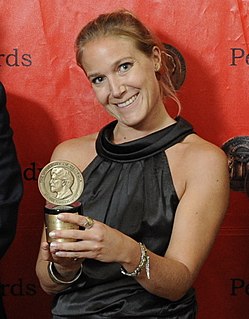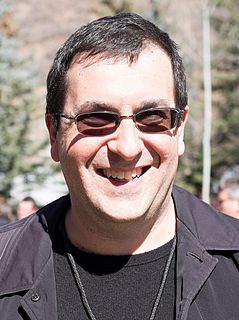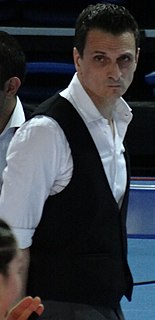A Quote by Rebecca Hamilton
o this idea that we fail to stop these things because there's not awareness about them, or that we need better early warning information, I'm increasingly skeptical of.
Related Quotes
There's a bigger question again about how to do prevention. It's not simply about putting out the early warning. The early warning was put out on Abyei; everybody knew that this was coming. This was intentional, and still it happened. So this idea that we fail to stop these things because there's not awareness about them, or that we need better early warning information, I'm increasingly skeptical of. I think it's about how you move that information into the policy process.
To be fearless is to be reckless. I think you need a certain level of fear because you need to respect the danger and the minute you stop sensing fear, that's the minute you stop respecting the danger, and that's when things can happen. Obviously, you can't panic. It can't be overwhelming. It can't be paralyzing. You always need to have that pit in your stomach. You always need to have that awareness about you.
You want to hire great people and give them the opportunity to fail. You need to let them figure things out as they go along. If they fail repeatedly, then you probably have to find a different person, but if you don't let people have that opportunity to fail, they don't get to learn and grow and try things.
If you can't fail then how can you possible develop as a communicator or as a creator of anything? We are locked into a deeply unhealthy notion that somehow you've got to succeed all the time. An appalling notion. Any painter or writer will tell you that that is no way to proceed. One of the things that will kill off a decent actor, especially a young actor early on and they will never recover from it, is too much success. It's disastrous. You stop being criticized, therefore you stop challenging yourself. You then can't afford to fail because there's too far to fall.
Amazon thrived because it implemented the online bookstore idea better than any of its early rivals did, not because it was the only company to have the idea or the first company to have the idea. It continues to grow only because it keeps trying to improve on the details of the idea and the way it puts it into practise.
You are awareness. Awareness is another name for you. Since you are awareness there is no need to attain or cultivate it. All that you have to do is to give up being aware of other things, that is of the not-Self. If one gives up being aware of them then pure awareness alone remains, and that is the Self.
Again, when we view a scene fleetingly, do we consciously see all the details even though we don't retain them, or do we not see them in the first place? Neurological information is crucial to deciding these questions. After all, they are so interesting precisely because unaided introspection cannot resolve them. Rather we need to know what is going on in the brain activities that constitute visual awareness.
































